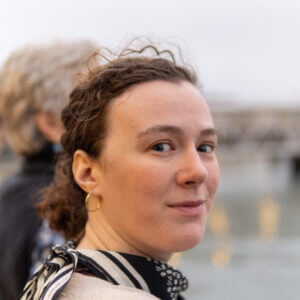- Term Available: On-Demand
- PD Hours: 1
- CEUs: 0.09
- On-Demand
- Online
You may be asking yourself, what exactly is a sensitive topic? Often, the topics that adults consider sensitive make us feel uncomfortable. These topics can be controversial, involving many different and strong opinions with no “right” answer. This self-directed course is designed to equip you with practical tools and resources to confidently and compassionately respond to young children’s questions about sensitive or complex topics.
In this course, you will gain tools for building a classroom community that supports and celebrates individual differences, learn how a supportive community of adults and peers strengthens children’s ability to explore complex topics and ask critical questions, practice skills for addressing complicated content and celebrating differences between people, in ways that are developmentally appropriate for ages 0-5, and discover helpful resources from the Smithsonian Institution to build community and support discussions around complex topics.
Course Information:
- Start Date: On-Demand
- Course Level: Beginner
- Target Audience: Education Staff
- Course Requirements/Prerequisites: None
- Course Meeting Times: None
- Completion Timeline/Duration: 30 Days
Learning Objectives:
- Gain tools for building a classroom community that supports and celebrates individual differences.
- Learn how a supportive community of adults and peers strengthens children’s ability to explore complex topics and ask critical questions.
- Practice skills for addressing complicated content and celebrating differences between people, in ways that are developmentally appropriate for ages 0-5.
- Discover helpful resources from the Smithsonian Institution to build community and support discussions around complex topics.
Head Start Alignment:
Head Start Program Performance Standards are used by the Office of Head Start to ensure that Head Start programs provide a safe, comprehensive, and high-quality learning and care experience to the young children and families they serve. The content in this course aligns with the following Head Start Program Performance standards:
- Program Operations: Subpart C – Education and Child Development
- Purpose (1302.30)(opens in a new tab): “…A program must deliver developmentally, culturally, and linguistically appropriate learning experiences in language, literacy, mathematics, social and emotional functioning, approaches to learning, science, physical skills, and creative arts.”
- Teaching and the Learning Environment, Effective Teaching Practices (1302.31.b.1.i) (opens in a new tab): “…Teaching practices must…emphasize nurturing and responsive practices, interactions, and environments that foster trust and emotional security; are communication and language rich; promote critical thinking and problem-solving; social, emotional, behavioral, and language development; provide supportive feedback for learning; motivate continued effort; and support all children’s engagement in learning experiences and activities.
The Early Learning Outcomes Framework (ELOF) is used by the Office of Head Start to ensure that learning content is developmentally appropriate for young learners. The content in this course aligns with the following ELOF standards:
- Infants and Toddler Domain:
- Goal IT-ATL 7. Child show interest in and curiosity about objects, materials, or events.
- Goal IT-SE 1. Child develops expectations of consistent, positive interactions through secure relationships with familiar adults.
- Goal IT-SE 10. Child shows awareness about self and how to connect with others.
- Goal IT-SE 11. Child understands some characteristics of self and others.
- Goal IT-C1. Child actively explores people and objects to understand self, others, and objects.
- Goal IT-C3. Child recognizes differences between familiar and unfamiliar people, objects, actions, or events.
- Goal IT-C5. Child uses memories as a foundation for more complex actions and thoughts.
- Goal IT-C10. Child uses matching and sorting of objects or people to understand similar and different characteristics.
- Preschool Domain:
- Goal P-ATL 11. Child shows interest in and curiosity about the world around them.
- Goal P-ATL 12. Child expresses creativity in thinking and communication.
- Goal P-SE 1. Child engages in and maintains positive relationships and interactions with adults.
- Goal P-SE 7. Child expresses care and concern toward others.
- Goal P-SE 9. Child recognizes self as a unique individual having own abilities, characteristics, emotions, and interests.
- Goal P-SE 10. Child expresses confidence in own skills and positive feelings about self.
- Goal P-SE 11. Child has sense of belonging to family, community, and other groups.
- Goal P-SCI 1. Child observes and describes observable phenomena (objects, materials, organisms, and events)
- Goal P-SCI 3. Child compares and categorizes observable phenomena.
Course Author

Julia Smith
Julia Smith is a Museum and Early Learning Specialist at the Smithsonian Early Enrichment Center’s (SEEC) Office of Engagement. In this position she offers curricular support to classroom educators working with children birth through kindergarten. She aids in developing lessons grounded in play and utilizing the surrounding museums and community. Additionally, Julia brings SEEC’s expertise in museum-based education for young children out to the world through professional development for educators, public programs, and partnerships with other educational institutions. Julia began her role at SEEC as a toddler educator. She is committed to advocating for the inclusion of all young children, particularly those 0-3 years, in educational spaces.
Course Partners


